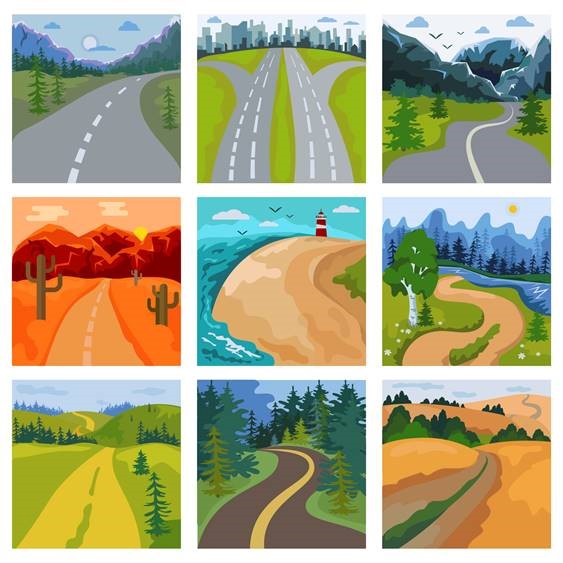

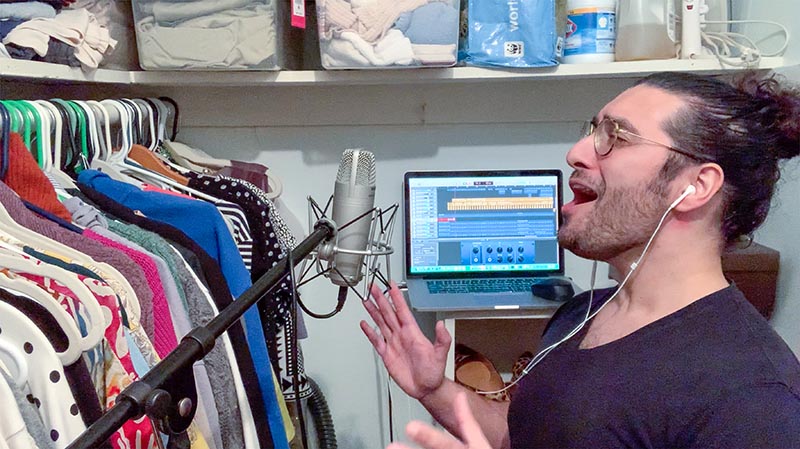

By Lindsey Lugsch-Tehle
From street devotionals to online collectives, people have come together in community in new and inventive ways to create uplifting music, our “spiritual food.” “No one thought that getting together and singing with people would be such an important part of a person’s life,” says Alexander Kruszewski, a musician and educator. And the pandemic has shown this to be true.
According to Kruszewski, music has long been a way to build bonds of unity and solidarity. Whether at a stadium concert or a backyard barbecue, where song is present people connect.
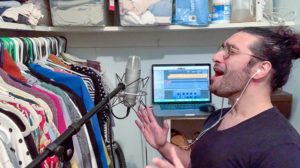

He describes music as indispensable to grassroots community building. He recalls one meeting before the pandemic, where he and some young people in his neighborhood in Falls Church, Virginia, explored avenues for service. It wasn’t until they began to sing songs on the ride home that a palpable sense of cohesion began to permeate the group. “In that moment they arrived,” says Kruszewski, “not just because they showed up for a study circle, it’s that they have the spirit now.”
‘Abdu’l-Baha, the son of the Founder of the Baha’i Faith, wrote over a century ago that “… music, sung or played, is spiritual food for the soul and heart.”
“It is that spirit, generated through music, that animates and elevates souls, connecting hearts with each other and with their Creator,” says Jessica Gaines, a musician and program coordinator at Green Acre Baha’i School in Eliot, Maine. Gaines believes that “music has the ability to assist us in tapping into our nobler aspirations, our nobler potentials, and our nobler emotions, and it inspires us to sacrifice for what we really, deeply believe in.”
Gaines says this is because “people believe what they feel.” This feeling is crucial to building vibrant communities because, she says, “transforming a conscious belief into an unconscious belief requires that that belief make its way into our nervous system. Music has the ability to do that because you are accessing your body, your heart, your brain, your nervous system, and your soul all at the same time.”
And when we do this in community, the community begins to embody that shared belief, that shared spirit. Research by Harvard University supports this: not only do breath patterns synchronize in communal song, but brainwaves and heartbeats do as well. Researchers posit that this synchronization contributes to pain relief—notably from both physical and social pain—the reduction of anxiety and depression, and improved memory, mood, and collaboration. Surprisingly, these benefits are found whether or not those singing and experiencing music together are in the same room.
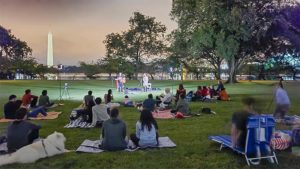

This research is heartening, says Kruszewski, given that over the past year a number of people have lived in isolation, unable to actually sing together. Many musicians have tapped into ingenuity to overcome such obstacles, he says. Kruszewski says he and longtime friend and fellow musician, Nickole Best, are collaborating as NIKNAK on an “upbeat, groovy album” of music that incorporates quotations from ‘Abdu’l-Baha.
Gaines records a cappella songs based on the Baha’i Writings and posts them online for others to learn. She is also spearheading a program at Green Acre called “Your Voice Matters,” in which participants can explore “music and the arts to help them develop spiritual perception and analyze the voices in media and within themselves.”
Kruszewski and Gaines also participate in virtual social spaces that build participants’ capacities through collaborative projects.
One such collective is FRMWRK [Framework], which Kruszewski calls “a fruit from this past year.” FRMWRK, like many
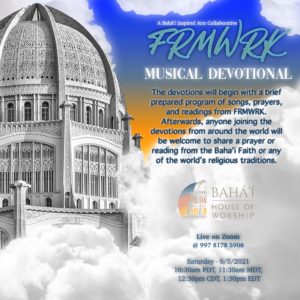

such collectives, began as a way for musicians and artists to gather and encourage each other’s creative processes, he says.
Emiliano Morondos, a founding member of FRMWRK, says, “a lot of people were online during the pandemic, and that limitation from the crisis helped to draw artists together for mutual support.”
Deeply rooted in Baha’i guidance, FRMWRK’s first EP (extended play recording), released in May, is a testament to unity in diversity. Morondos says the collective studied a message from the Universal House of Justice, the international Baha’i governing council, to the U.S. Baha’i community and “realized that one of the central themes was embracing this call to combat the ‘most challenging issue’ of racism.”
For this EP, Morondos says “the intention was to really give a voice to the people who have historically had their voices silenced or muffled. This in itself added a new level of unity to the project and gave us a very diverse foundation.”
Whether using Afro-Caribbean rhythms, Asian instrumentation or simply harmonies in different vocal styles, Morondos adds, “music lets people enter into a section of humanity that they might not have had access to before.”
FRMWRK’s next project aims to highlight the life and example of ‘Abdu’l-Baha, in response to another recent message that calls on communities around the world to reflect on and commemorate His historic import in the coming year, the 100th anniversary of His passing.
Kruszewski says that collectives like FRMWRK, which include artists from across the country and around the globe, are proving to be “living, breathing evidence of how the work being done in neighborhoods is connected to communities around the world.”
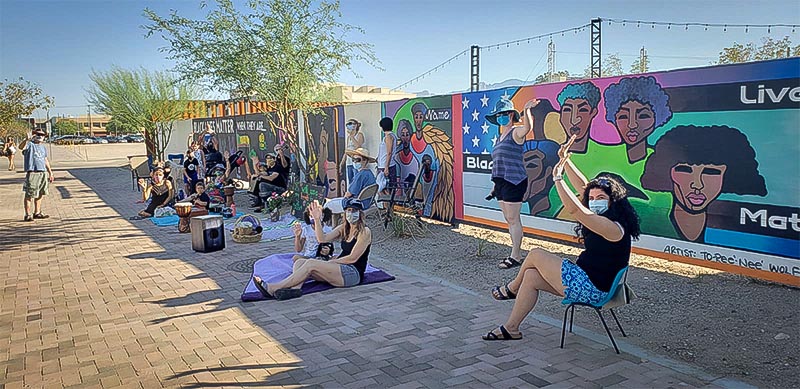

For example, in Tucson, Arizona, an online virtual children’s prayer gathering has evolved into a monthly outdoor street musical devotional where people can safely gather. It’s called “Bless the Streets: Prayers for Racial Justice & Healing.”
Katrinka Heyman, mother and gathering organizer, recognized many families were feeling fatigued by virtual meetings when she noticed an outdoor space that had been beautified with murals created by culturally diverse local artists. She launched the outdoor gatherings in August, and after a two-month pause due to weather, they have resumed.
“This space has become a grounding point for so many people, a space where needs are met,” she says.
One guest, a woman recently released from a local immigration detention center, says “I did not know what to expect, but this turned out to be a big part of the healing that I have been looking for.”
It is this healing that is possible through music—healing of hearts, souls, and community relations, says Heyman.


![]()
![]()
Whether you are exploring the Bahá'í Faith or looking to become an active member, there are various ways you can connect with our community.
Please ensure that all the Required Fields* are completed before submitting.